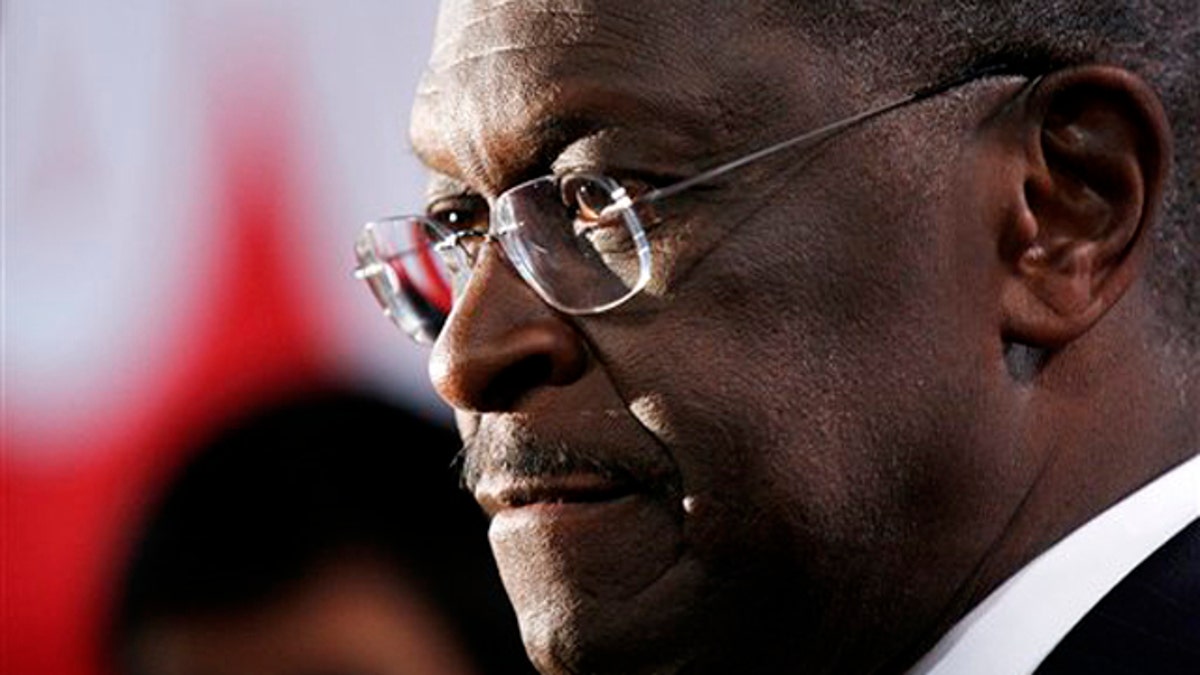
Oct. 18, 2011: Republican presidential candidate Herman Cain speaks with the media following a Republican presidential debate in Las Vegas. (AP)
One of the key economists who helped presidential candidate Herman Cain draft his 9-9-9 tax plan is backing away from the most controversial component of it, warning that the criticism Cain endured at Tuesday night's Republican presidential debate shows his proposed 9 percent national sales tax might have to go.
"It was such a dart board," economist Stephen Moore said Wednesday of the proposal.
Cain weathered a storm of complaints over his tax plan at the Republican debate in Las Vegas. Virtually every candidate took turns accusing the businessman of pushing a scheme that would introduce new streams of revenue and hit the middle class hardest.
The plan calls for throwing out the old tax code and replacing it with an across-the-board 9 percent income tax, 9 percent corporate tax and 9 percent national sales tax.
Though Cain parried point-for-point with his opponents and stood by the plan, Moore said the debate further confirms his belief that the candidate should strip the sales tax out of his plan, and replace it with a 9 percent payroll tax.
The payroll tax isn't necessarily popular -- but it's also not new.
"They wouldn't be able to attack it," Moore told FoxNews.com. "If he had done that a week ago, then they wouldn't be able to attack the plan last night."
Moore said he just wrote a "note" to fellow economist Art Laffer, who helped design the plan and continues to defend it, explaining his position. Moore is also an editorial writer for The Wall Street Journal and clarified that he is not actively advising the Cain campaign.
Moore said he likes the sales tax idea and thinks it would be "rocket fuel for the economy," but explained that it's just too much of a punching bag. Ideally, he said, he would lift the cap on income subject to the Social Security component of it, so "LeBron James would pay 9 percent tax" on his full salary.
Moore first raised the idea of changing the Cain plan during an interview over the weekend on economist Larry Kudlow's radio show. He said he was "surprised" at how "hostile" people were to the sales tax component.
"I've come to the conclusion that the American people and the voters do not want a national sales tax," he said.
Currently, employees pay a combined 7.65 percent payroll tax to cover Medicare and Social Security while the employer matches it with another 7.65 percent. Moore said his proposed 9 percent payroll tax would be split evenly between employers and employees.
Cain's easy-to-understand tax plan helped him gain attention on the campaign trail and at recent debate, and helped fuel his rise to frontrunner status alongside former Massachusetts Gov. Mitt Romney. But now that Cain is at the front of the field, his tax plan is coming under intense scrutiny.
David Avella, president of Republican recruiter GOPAC, said Cain needs to decide how much he believes in the sales tax component. Avella, who attended the Las Vegas debate and saw the criticism Cain endured close up, said he will need to do a better job explaining the upsides if the sales tax stays.
"If he thinks the sales tax is a viable part of his plan, he's going need to keep it in there, and do his best to sell it to the American people," Avella told FoxNews.com. "All of his rivals jumped on him about it. And I don't know that encouraging people to go read the plan is enough to ... win converts to his plan."
At the debate, his opponents were quick to invoke a new study from the Tax Policy Center showing 84 percent of households would see their taxes increase under the plan, with lower and middle income families hit hardest.
"We're talking about major increases in taxes on people," former Pennsylvania Sen. Rick Santorum said.
Cain argued that the claims made against his plan simply are "not true."
The other candidates also pointed out repeatedly that the national sales tax would come on top of state and local taxes.
Cain accused his critics of comparing "apples and oranges."
The following is one such exchange:
Romney: "Herman, are you saying that the state sales tax will also go away?"
Cain: "No, that's an apple."
Romney: "Okay."
Cain: "We're replacing a bunch of oranges."
Romney: "Okay."
Cain went on to say consumers will pay the state sales tax "no matter what."
Romney answered, "And I'm going to be getting a bushel basket that has apples and oranges."
As Moore says he's going to urge Cain to reconsider the sales tax component, at last look, Laffer was sticking by it, sales tax and all.
Laffer, a Reagan-era economist who has a theoretical "curve" named after him that depicts the diminishing returns of higher taxes on government revenues, wrote in The Wall Street Journal Wednesday that he "wholeheartedly" supports 9-9-9. The plan would hit those in the lower income brackets because some of them aren't paying any tax now -- a national sales tax would catch most people, though Laffer said there would be exemptions for those below the poverty line.
Laffer said broadening the base is better than the alternative.
"I support collecting more in taxes from people with high incomes who choose to actually pay taxes at lower tax rates than use lawyers and accountants to avoid taxes at higher tax rates," he wrote. "Some tax revenues at low tax rates is a heckuva lot better than no tax revenues at high tax rates."




















